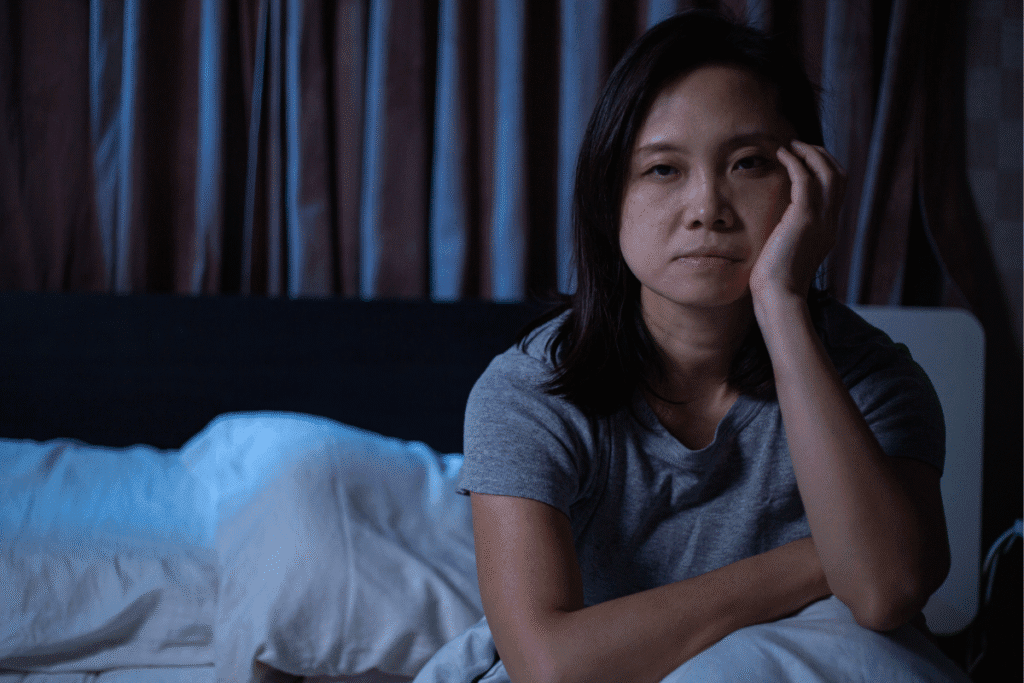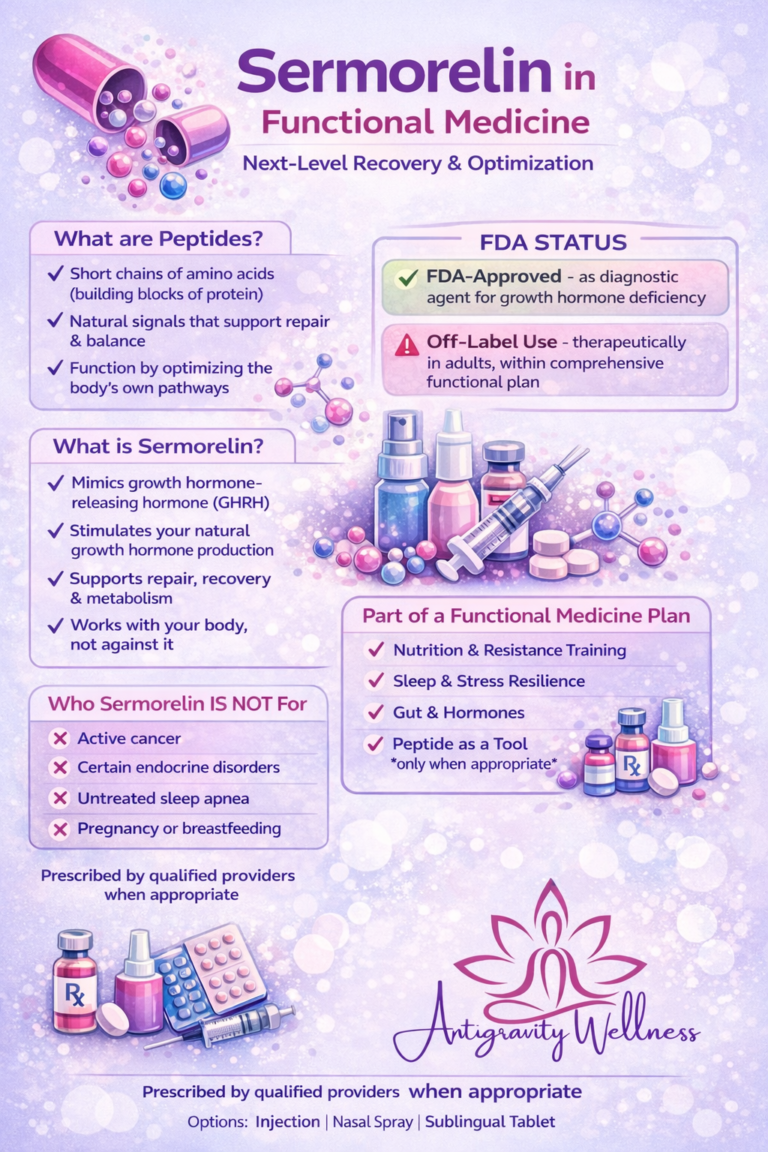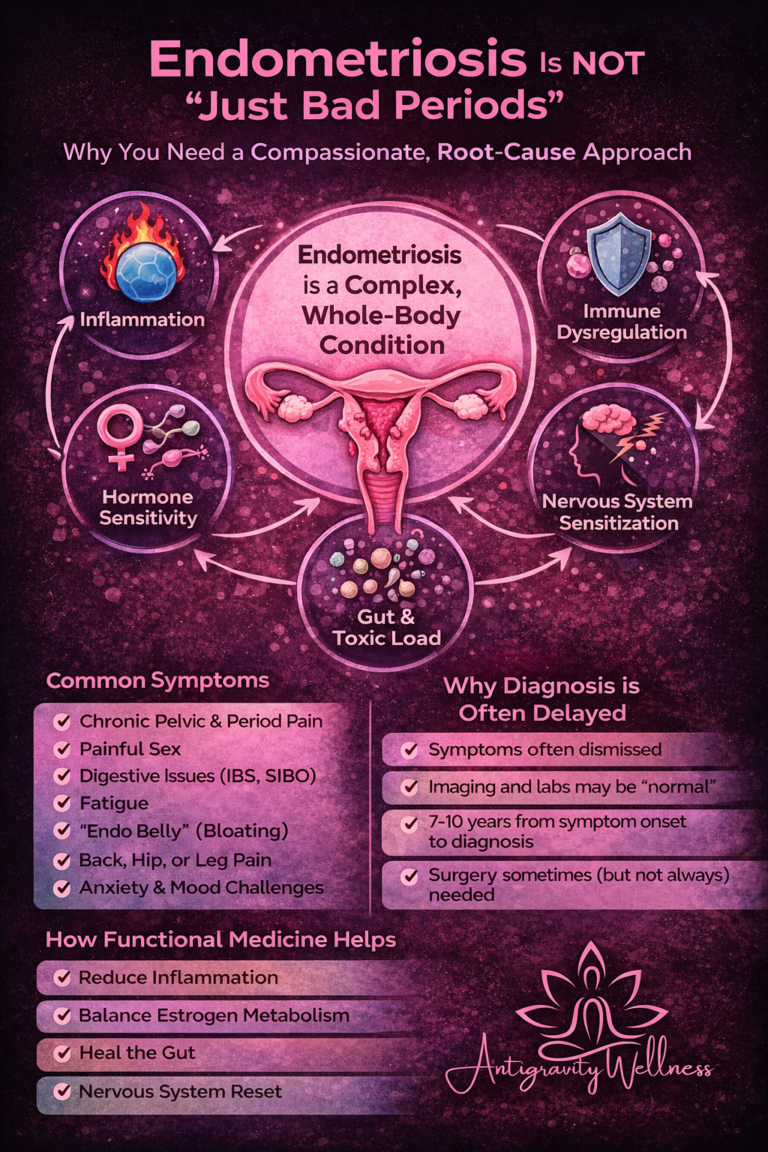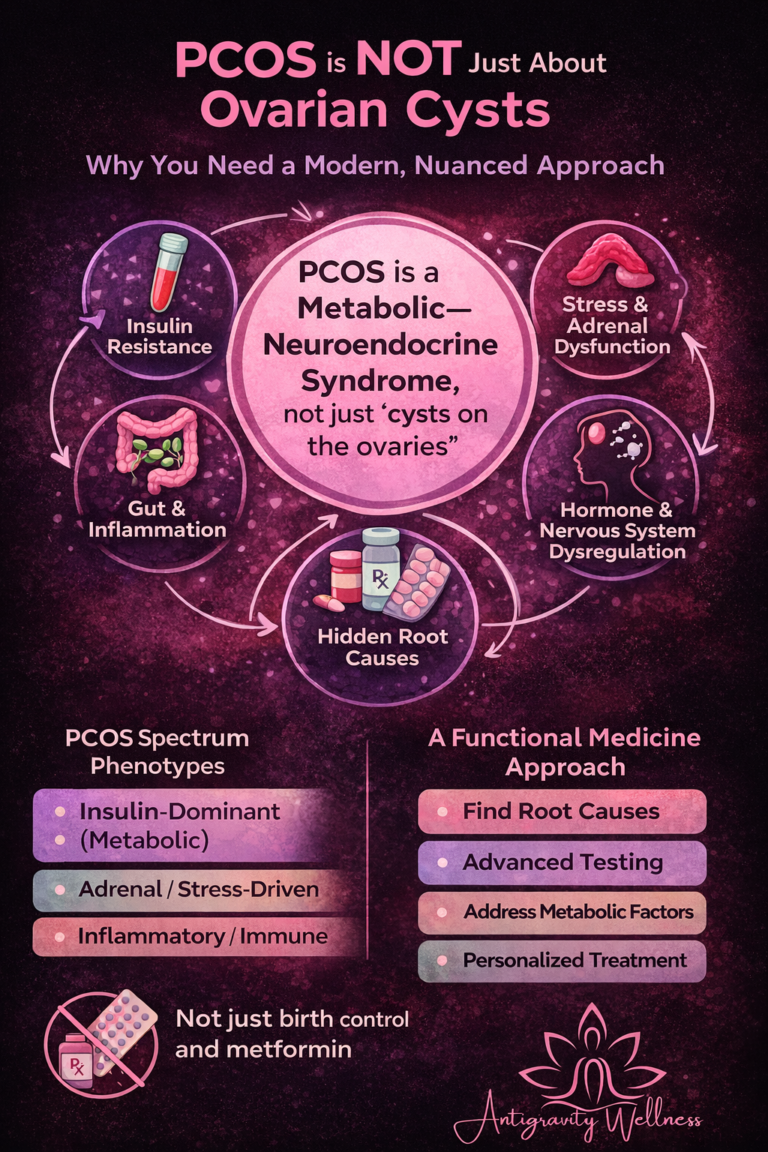
“I used to sleep like a rock…”
That’s what Sarah, 44, told me during our first visit.
She had always been a great sleeper. Head hit the pillow, lights out, no problem. But over the past year, something had shifted. She was waking up at 3:00 a.m. with her heart racing. Some nights, she couldn’t fall asleep until hours after she went to bed. Other nights, she’d wake up soaked in sweat with the covers kicked off.
She was exhausted. But when she mentioned this to her primary care provider, they told her, “That’s just part of getting older. Try melatonin.”
Sarah’s story is all too common. If you’re a woman in your late 30s or 40s and your once-predictable sleep has gone haywire, you are not broken—and you are not alone.
Why Sleep Gets Harder in Perimenopause
Perimenopause is a time of major hormonal transition, usually starting in the late 30s to mid-40s. During this time, estrogen and progesterone levels fluctuate and begin to decline. These hormones play critical roles in regulating sleep, body temperature, and mood.
Here’s what’s happening under the surface:
- Progesterone, your natural calming hormone, starts to decline—leading to more anxiety, racing thoughts, and difficulty falling asleep.
- Estrogen becomes erratic, disrupting your body’s ability to regulate temperature and serotonin, which can lead to hot flashes, night sweats, and mood swings.
- Melatonin production becomes less reliable as your hormonal rhythm shifts, especially if cortisol (your stress hormone) is elevated at night.
The result? Light, disrupted sleep that leaves you drained no matter how early you go to bed.
Lifestyle Hacks to Support Deep Sleep
While you can’t stop the hormonal shifts, you can support your body in adapting to them. Here are some simple, powerful changes that can improve your sleep quality:
🌞 Morning Routine
- Get 10+ minutes of natural light within an hour of waking to regulate your circadian rhythm and support evening melatonin production.
- Avoid hitting snooze—get up at the same time every day to anchor your body clock.
🌙 Evening Routine
- Screens off by 9 p.m. Blue light blocks melatonin and delays sleep onset.
- Create a consistent wind-down hour: warm bath, herbal tea, soft lighting, reading, or stretching.
- Keep your bedroom cool and dark. Consider a cooling mattress topper or breathable sheets.
🧠 Mindfulness + Brain Dump
- Journaling before bed or practicing deep breathing can help calm racing thoughts.
- Try a quick brain dump to “download” your to-dos and worries before sleep.
Supplements That May Help (With Medical Oversight)
Some supplements can support sleep during perimenopause, but they should always be used under the guidance of a healthcare professional:
- Magnesium glycinate: Calms the nervous system, helps with anxiety and muscle relaxation.
- L-theanine: Promotes relaxation without drowsiness.
- Valerian root, lemon balm, or chamomile: Herbal support for light insomnia.
- Melatonin: Can help in the short term, but isn’t a fix for hormonal imbalances.
⚠️ Always check with your provider—especially if you’re taking medications or managing other health conditions.
How BHRT Can Help: The Progesterone Difference
Bioidentical Hormone Replacement Therapy (BHRT) can be a game-changer for many women struggling with sleep in perimenopause. In particular, oral micronized progesterone (not to be confused with topical forms) has been shown to:
- Act on GABA receptors in the brain, promoting a calming, sedative effect
- Improve sleep initiation and maintenance
- Reduce nighttime awakenings and anxiety
Topical progesterone does not pass through the liver and therefore does not create the same sedating metabolites—making oral the preferred form for sleep support.
At Antigravity Wellness, we evaluate your full hormonal picture to determine if BHRT is a good fit, and we always use bioidentical forms that are safe and effective when monitored appropriately.
Should You Get a Sleep Study? Yes—And Here’s Why.
Sleep disorders like obstructive sleep apnea (OSA) are underdiagnosed in midlife women, especially during and after menopause. Some signs you may benefit from a sleep study include:
- Loud snoring or gasping for air at night
- Morning headaches or dry mouth
- Daytime fatigue despite “sleeping” 7+ hours
- Waking up multiple times to urinate
- High blood pressure or unexplained weight gain
🩺 How to talk to your doctor:
“I’ve been having disrupted sleep, daytime fatigue, and [list symptoms]. I’m in my 40s and I’ve heard that sleep apnea is often missed in women. Can we talk about getting a home sleep study?”
A proper diagnosis could change your entire life—quality sleep is foundational to your brain, heart, hormones, and metabolism.
What About Prescription Sleep Aids?
Prescription medications like zolpidem (Ambien), eszopiclone (Lunesta), or benzodiazepines may be offered for insomnia. But while they may help you fall asleep, they don’t always improve restorative sleep (REM and deep stages).
Potential downsides:
- Grogginess and impaired memory
- Dependence or tolerance
- Increased fall risk in midlife and beyond
- Suppression of REM and deep sleep over time
These should only be used short-term and under medical supervision, while the underlying causes of sleep disruption (like hormones, stress, and environment) are addressed. Our goal is always to help you wean off safely when ready.
How Antigravity Wellness Can Help
If you’re a woman over 35 who’s waking up exhausted no matter how early you go to bed, our 4-Step Hormone Harmony Method is designed for you.
At Antigravity Wellness, we:
- Identify root causes through functional lab testing
- Rebalance hormones through nutrition, supplements, and BHRT when appropriate
- Support your nervous system and circadian rhythm
- Empower you with tools and community for long-term success
You don’t need to settle for sleepless nights and foggy days. We help women feel strong, clear, and rested again.
Want to Take the Next Step?
📣 This is the last week of our June Summer Special:
🎯 50% OFF your Brief Initial Consult with Dr. Nicole Smith (WA & OR residents only). BOOK HERE.
Not ready yet?
💌 Grab our FREE 5-Day Hormone Reset here.
💤 For our favorite products and sleep routine tips, download our Tranquil Sleep Guide here.
Medical Disclaimer:
The information provided in this article is for educational purposes only and is not intended as a substitute for professional medical advice, diagnosis, or treatment. Always consult your healthcare provider before starting any new supplement, medication, or health routine, especially if you have a medical condition or are taking other medications.
References:
- Baker FC, De Zambotti M, Colrain IM, Bei B. Sleep problems during the menopausal transition: prevalence, impact, and management challenges. Nat Sci Sleep. 2018;10:73–95. https://pubmed.ncbi.nlm.nih.gov/29445307/
- Friess E, Tagaya H, Trachsel L, Holsboer F, Rupprecht R. Progesterone-induced changes in sleep in male subjects. Am J Physiol. 1997;272:E885–E891. https://pubmed.ncbi.nlm.nih.gov/9176190/
- Mong JA, Cusmano DM. Sex differences in sleep: impact of biological sex and sex steroids. Philos Trans R Soc Lond B Biol Sci. 2016;371(1688):20150110. https://pubmed.ncbi.nlm.nih.gov/26833831/
- Kravitz HM, Joffe H. Sleep during the perimenopause: a SWAN story. Obstet Gynecol Clin North Am. 2011 Sep;38(3):567-86. https://pubmed.ncbi.nlm.nih.gov/21961720/
- Vgontzas AN, Liao D, Pejovic S, et al. Insomnia with objective short sleep duration: The most biologically severe phenotype of the disorder. Sleep Med Rev. 2013 Aug;17(4):241-54. https://pubmed.ncbi.nlm.nih.gov/23419741/




